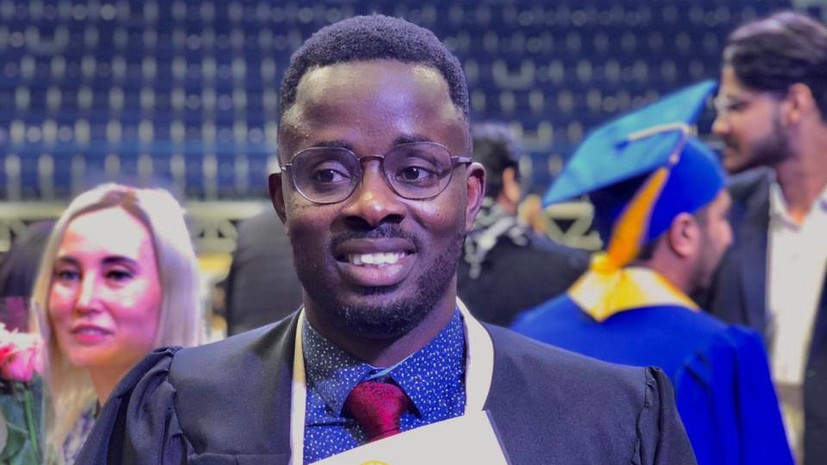According to his first education, received in Nigeria, Samuel is a civil engineer.
But he says he was always drawn to medicine.
“I followed in the footsteps of my father into construction, although I always wanted to become a doctor,” he shared with RT.
— After finishing my studies at the university, I had the opportunity to go to Turkey or Finland.
But when I learned about the recruitment of applicants to be sent to Russian medical universities, I realized that this was my chance.”
Samuel's parents supported their son and agreed to pay for his education.
First, the young man went to Volgograd at the invitation of a Nigerian curator who was recruiting a group of applicants.
There he studied Russian for six months.
According to Akinyemi, there were some funny situations related to translation difficulties.
“I really like to have semolina porridge for breakfast.
I looked in the translator to see how the product I needed would be written in Russian, and went to the store.
But by the time I got there, I forgot the word, I only remembered that it starts with “M” and ends with “A”.
I saw a seemingly suitable package of white powder and bought two packs—for myself and for my curator.
For two days I ate porridge made from this and told my parents that in Russia semolina (semolina) is much tastier than at home.
And on the third day my stomach hurt.
The curator arrived, called an ambulance, and when I gave him the package of cereal I had bought as a gift, he said that it was not semolina, but flour,” recalls Samuel.
© Photo from personal archive
The Nigerian has learned Russian sufficiently to avoid similar incidents in the future.
But the knowledge gained in the courses would not be enough to teach medicine.
Therefore, Samuel decided to enroll in a program where classes are conducted in English - the corresponding enrollment at that moment was taking place at the Bashkir State Medical University.
"People are surprisingly serious"
In Ufa, the Nigerian felt all the delights of the Russian winter: “The whole family watched Russia in the news and admired this great power.
But after the first winter in Ufa, I had only one question for the Russians: “How do you live in this refrigerator?!”
Eight years after moving, Samuel still couldn’t fully get used to the winter season: “I’m still terribly cold.
Although I started skiing and even took part in university competitions, I cannot say that it became my favorite sport.
But that’s because I’m generally wary of traumatic activities.”
© Photo from personal archive
At the same time, he loved the city of Akinyemi himself with all his heart.
“I adapted easily.
Ufa is large, modern, and has everything for a comfortable stay.
My favorite place in the city is the television center area, there is a huge monument to the national hero Salavat Yulaev nearby.
“I often go jogging there,” says RT’s interlocutor.
“But the people here are surprisingly serious.”
In my country, the norm is, for example, to dance to music on headphones if you want.
And here you will immediately meet a very stern look.
This is unusual."
He also liked the local cuisine: he especially loved dumplings and the Bashkir dish tukmas (noodle soup with chicken).
But the first trip to the bathhouse made a mixed impression on RT’s interlocutor.
“I was then dating a Russian girl, she invited me to her home.
Bathhouse, barbecue.
Her father in the steam room told me to lie down on a shelf and began, as it seemed, to beat me with brooms.
I was completely sure that he decided to kill me in this way because I was dating his daughter!
I was afraid to even breathe, let alone ask him to stop.
As a result, the girl’s father walked away to give some steam, and I ran out of the bathhouse.
It’s still funny to remember this incident,” he says.
Now Samuel is finishing his residency and working as an oncologist trainee at the BSMU Clinic.
In his free time, he teaches English at universities and gymnasiums.
“I love working here.
Modern equipment, friendly colleagues, patients who treat you well - what more do you need?”
- he reasons.
© Photo from personal archive
In the summer, RT’s interlocutor works in language camps for children, where schoolchildren learn English with native speakers.
During one of these shifts, Akinyemi saved a drowning child.
“It’s lucky here that the English teacher is also a doctor,” he smiles.
“But I don’t think I did anything supernatural.”
It’s okay to save.”
In 2021, Samuel received Russian citizenship and this year plans to vote for the first time in the Russian presidential election.
He says that the procedure itself differs from the Nigerian one: “About a year before the elections, we receive a special voter card and go to the polling station with it.
We register using a card, receive a form and go into a booth where we put a fingerprint in front of our candidate.
In Nigeria, presidential elections are held once every four years.
Here they take place on a daily basis, but in Russia there are often some cultural events.
I want to feel this atmosphere.”

